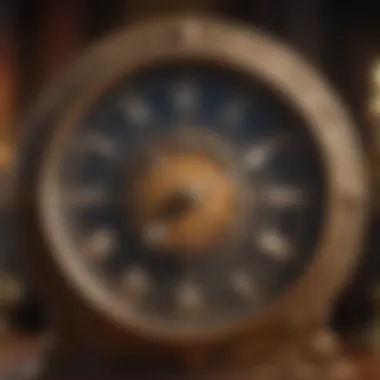Understanding Your Birth Time: An In-Depth Guide


Intro
Understanding one's birth time is a crucial aspect of astrology, deeply influencing an individual's natal chart. The precise moment of birth provides essential insights into one's personality, strengths, and life path. In this guide, we will explore various methods to determine your birth time, and its implications in astrological readings. This exploration aims to enhance your self-awareness through the astrological framework, allowing for deeper introspection and understanding.
Astrological Concepts
Definition of Key Terms
To lay a solid foundation, it is essential to define key terms in astrology: natal chart, ascendant (or rising sign), and aspects. Each of these elements plays a vital role in analyzing one’s astrological profile.
- Natal Chart: A map of the sky at the exact moment of a person's birth. It illustrates the positions of the Sun, Moon, and planets.
- Ascendant: The zodiac sign that was rising on the eastern horizon at the time of birth. It significantly affects how one is perceived by others.
- Aspects: The angles formed between the planets in a natal chart, indicating interactions and influences.
Historical Background of Astrology
Astrology has a rich and diverse history, originating in ancient civilizations such as Babylon and Egypt. Initially used for agricultural and calendrical purposes, it evolved into a systematic study of celestial movements and their effects on human affairs. Over time, astrology has integrated various cultural perspectives and methodologies, making it an expansive field of study today.
Overview of Different Astrology Branches
Astrology encompasses several branches, each with a distinct focus:
- Western Astrology: Based on the tropical zodiac, which aligns with the seasons.
- Vedic (Jyotish) Astrology: Originating from ancient India, this system uses the sidereal zodiac.
- Horary Astrology: Answers specific questions by analyzing the chart created for the moment the question is asked.
- Electional Astrology: Focuses on determining the most auspicious times for important actions or events.
Zodiac Signs Exploration
In-Depth Analysis of Each Sign
The zodiac comprises twelve signs, with each having unique attributes and influences. Understanding these can provide clarity on how birth time impacts personal traits.
Personality Traits and Characteristics
Each zodiac sign is associated with specific personality traits:
- Aries: Bold, energetic, and competitive.
- Taurus: Patient, practical, and reliable.
- Gemini: Adaptable, witty, and communicative.
- Cancer: Intuitive, sensitive, and nurturing.
- Leo: Confident, charismatic, and natural leaders.
- Virgo: Detail-oriented, analytical, and modest.
- Libra: Diplomatic, fair-minded, and sociable.
- Scorpio: Passionate, deep, and mysterious.
- Sagittarius: Adventurous, optimistic, and philosophical.
- Capricorn: Disciplined, responsible, and ambitious.
- Aquarius: Innovative, independent, and unconventional.
- Pisces: Compassionate, artistic, and empathetic.
Historical and Mythological Connections
Astrology is intertwined with mythologies across cultures. Each sign is linked to ancient deities and legends, providing deeper insight into their characteristics and influence on personality.
Celestial Events
Major Cosmic Phenomena
Understanding the movements of celestial bodies is essential for astrological readings. Key phenomena include planetary retrogrades, eclipses, and transits. These events can significantly impact personal energies and chart interpretations.
Impact of Celestial Events on Astrology
Astrologers often analyze how celestial events correspond with personal experiences. For example, a planet in retrograde may prompt introspection and reevaluation in one's life.
Rituals and Practices During Celestial Events
Many believe that rituals conducted during cosmic events can enhance personal connection to the universe. These rituals often involve meditation, reflection, and intention setting to align oneself with the energies at play.
“Your birth time is not just a timestamp; it is a doorway into understanding who you are and how you navigate the world.” – Insight into the power of birth time in astrology.
Prelims to Birth Time in Astrology
Understanding your birth time is crucial in astrology. It serves as a cornerstone for creating an accurate natal chart, which is essential for meaningful astrological interpretations. Birth time dictates the rising sign, also known as the Ascendant, which influences personality traits and life experiences. Without this precise detail, the astrological reading may lack depth and accuracy.


Why Birth Time Matters
Birth time is not merely a detail; it shapes the entire astrological framework used to interpret an individual’s life. It allows astrologers to delineate the positions of celestial bodies at the moment of one's birth. Thus, omitting this information could lead to incorrect conclusions or misinterpretations. In astrological practice, minute differences in time can result in varying planetary placements, which can significantly impact one’s astrological reading.
For instance, two individuals born on the same day, but hours apart, may manifest completely different life challenges and advantages due to the shifting positions of the Moon and other significant planets. This variance illustrates how pivotal birth time is in understanding the fluid dynamics of astrological influence on personal character and fate.
Astrological Implications
Astrology relies on precise calculations. When an accurate birth time is noted, it allows for a comprehensive chart that includes the houses of the zodiac. These houses specify various life areas, such as relationships, career, and personal growth. The Ascendant, which changes approximately every two hours, marks the beginning of the first house. Hence, it determines how individuals present themselves to the world.
Additionally, the planetary configurations at your birth can elucidate potential challenges and strengths. For example, someone with their Sun in the 10th house may find their career path particularly significant, while another, with the Sun in the 4th house, may prioritize home and family life.
Historical Context of Birth Records
The historical context of birth records plays a pivotal role in understanding birth time in astrology. Recorded birth times are not only vital for astrological diagnosis but also reflect broader social and governmental systems. The accuracy and availability of these records can influence astrological interpretations and personal identity. Understanding the evolution and regional differences in this documentation allows us to appreciate the complexity involved in obtaining one’s birth time.
Evolution of Recorded Births
The practice of recording births has a rich history that dates back to ancient civilizations. In many cultures, birth records were maintained as a means to establish lineage and heritage. Over time, this practice evolved into a formalized system that governments adopted. In the Middle Ages, for example, churches were often responsible for maintaining birth records. They documented births primarily for baptismal purposes. This led to discrepancies, as the records were not always consistent or widely accessible.
As societies progressed into modernity, the establishment of civil registrations became the norm. Nations instituted laws requiring the documentation of births. This ensured a standardized method of keeping track of citizens. The introduction of the official birth certificate varies from country to country, reflecting local customs, governance models, and social organization. Understanding this evolution provides insight into how previous practices impact the availability of birth time information today.
Regional Differences in Documentation
Documentation practices around birth vary significantly across regions. In some countries, like the United States, birth certificates are readily available and accessible to individuals. Conversely, in regions with less formal bureaucratic systems, such as some rural areas in developing countries, birth records may not exist or may be fraught with inaccuracies.
Cultural significance also plays a part in how birth is documented. In certain cultures, the time of birth might be considered less important than other details, such as the lineage or family background. In contrast, astrology-rich cultures like India place immense significance on precise birth times, influencing how meticulously birth records are kept.
"The availability and accuracy of birth records can significantly affect astrologers' interpretations and personal readings."
Recognizing these regional differences underscores the challenges faced by individuals when attempting to verify their birth time. Understanding where to look for records can be greatly influenced by one’s geographical and cultural context. Consequently, a grasp on the historical variations in birth documentation not only enriches one’s astrological knowledge but also presents a roadmap for personal exploration.
Methodologies for Discovering Birth Time
Understanding how to discover your accurate birth time is essential for astrological analysis. Birth time plays a critical role in the calculation of astrological charts. It can influence your Moon sign, rising sign, and the placement of planets in houses, which guide interpretations and predictions. Establishing methods for discovering this information can lead to a more comprehensive understanding of your astrological profile.
Official Birth Certificates
Official birth certificates are one of the most reliable sources for finding your birth time. These documents are produced by governmental agencies at the time of birth. They typically contain the date, time, and place of birth. When available, this information can provide a solid foundation for astrological calculations. However, not every birth certificate includes a time of birth, which can create limitations for some individuals. It is crucial to verify this information first, as inaccuracies can lead to misleading astrological interpretations.
Family Records and Ancestral Knowledge
Family records and ancestral knowledge can also play a significant role in determining your birth time. Many families keep detailed records of births, including notes on timing. Family history can provide insight into this information and may even contain personal anecdotes related to your arrival. Additionally, older family members might remember details about the day you were born, including testimonies related to the exact moment. These methods can be useful, yet they rely on the accuracy of memory and personal documentation, which might vary in reliability.
Hospital and Medical Records
Hospitals often maintain medical records that include vital details of the birth process, such as the exact time of delivery. These records can offer a secondary source of verification. However, accessibility may be an issue due to privacy regulations or record retention policies. It is advisable to contact the hospital where you were born to check if they have this information on file. Securing a copy of your medical records might necessitate authorization forms or even fees.
Seeking Third-party Confirmation
Lastly, seeking third-party confirmation can augment your efforts in finding your birth time. An astrologer or expert in astrology might utilize techniques such as birth chart rectification to estimate your birth time based on significant life events, personality traits, and experiences. This method involves detailed analysis and interpretation. While not precise as a birth certificate, it can provide an educated approximation that aids in astrological assessments. In cases where documentation is wholly unavailable, these expert interpretations can be invaluable.
Remember: Having a documented birth time enriches your astrological experience by allowing for more personalized insights.
Alternative Methods When Records are Unavailable
When official records are absent, identifying one's birth time can feel daunting. Alternative methods play a crucial role in this process. They provide avenues for individuals to seek deeper insights into their astrological profiles even when direct documentation is not present. By employing these methods, individuals gain the potential to access tailored astrological readings, which can significantly enhance self-awareness and personal growth. The approach encourages a deeper connection with one’s astrological identity, moving beyond mere dates to a more personalized understanding of cosmic influences.


Astrological Rectification Techniques
Astrological rectification is a process that helps determine the most accurate birth time when records are missing. It relies heavily on personal life events and milestones to align with celestial movements. This technique is vital for anyone keen on astrology, as it provides a methodical approach to pinpoint an accurate birth time through observation and analysis.
Solar Arc Method
The Solar Arc Method is well-respected in astrological circles. This technique involves calculating the distance between significant life events and the natal positions of planets. One noteworthy aspect is its straightforward nature; practitioners simply need to take the natal chart and apply it to key events.
The key characteristic of this method is its ability to provide a reliable estimate of the rising sign during the time of birth. This makes it a beneficial choice for those looking to construct a more precise astrological profile. However, a unique feature is its reliance on external events rather than just intrinsic chart elements. Thus, while advantageous, it may not always lead to perfect accuracy.
Transits and Progressions
Transits and progressions offer another dimension for refining birth time. This method examines the positions of current planetary movements and their relationships to the natal chart. It helps astrologers see how ongoing cosmic dynamics influence an individual’s life.
A key characteristic of transits and progressions is their adaptability. This method allows adjustments based on continuous changes, making it a popular choice among practitioners. The unique feature lies in its dynamic nature, as it emphasizes that an astrological chart is not static but continually evolving. The potential disadvantage, however, is the complexity and the number of variables involved, which can sometimes confuse newcomers or lead to misinterpretation.
Consulting Experienced Astrologers
Engaging with seasoned astrologers is another way to navigate the challenges of unrecorded birth times. Their expertise can provide invaluable guidance and insight into one’s astrological profile. Many experienced practitioners have methods and tools that go beyond DIY approaches, offering a level of precision that self-analysis cannot achieve. They can intuitively assess personal histories, guiding clients through a process layered with details that one may overlook.
"Consulting with someone skilled in astrological techniques can mean the difference between guesswork and clarity."
Through these direct consultations, individuals can explore their unique circumstances, allowing for a more personalized interpretation of the cosmic influences at play. As such, this option stands as a pillar in the search for one’s birth time when traditional records are out of reach.
Cultural Perspectives on Birth Time
Cultural perspectives on birth time offer valuable insights into how different societies understand and interpret the significance of this moment. Recognizing that birth time is not merely an astrological detail, it also envelops a myriad of beliefs and traditions shaped by historical and cultural contexts. This section explores the varying attitudes toward birth time and its impact across cultures, revealing the rich tapestry of astrology in human life.
Astrology in Different Cultures
Western vs.
Eastern Astrology
Western and Eastern astrology provide divergent frameworks for interpreting astrological data, including birth time. In Western astrology, the emphasis is placed on the individual's birth chart, which maps the positions of the planets at the exact moment of birth. This tradition is deeply ingrained in psychological interpretations of personality and life events, often associating specific planets with character traits.
Eastern astrology, particularly Vedic astrology from India, employs a more complex system that includes the lunar calendar and various zodiacal charts. This system focuses not only on individual characteristics but also on collective cycles of karma and dharma, which can provide a broader context to an individual's life.
The key characteristic distinguishing these two practices is the foundational approach to time and interpretation. For example, Western astrology typically values the solar chart, which focuses on the sun's position. Meanwhile, Eastern astrology often prioritizes the moon's position, leading to different insights into personal identity.
Despite these differences, both systems provide vital insights into how birth time can influence an individual, thus reaffirming the importance of understanding it across astrological practices.
Indigenous Practices
Indigenous practices around the world often integrate birth time into a rich cultural and spiritual context. Many indigenous cultures have unique cosmologies that intertwine the moment of birth with broader natural cycles. For example, among some Native American tribes, a child's birth time can be linked to specific animal totems, connecting the individual to traits associated with that animal.
A significant aspect of these practices is their focus on community and the environment. Birth ceremonies may involve rituals that celebrate the child's connection to nature and their role within the community. This perspective allows for a deeper understanding of an individual’s place in the universe beyond just the astrological data.
However, the challenge often lies in the preservation of oral traditions. The transmission of knowledge about birth time and its significance can sometimes be diluted in modern contexts, risking the loss of valuable cultural insights.
Significance of Timing Across Cultures
Timing holds profound significance across various cultures, shaping experiences and understandings of life. The beliefs about auspicious times for birth or particular moments of transition significantly impact social customs and individual identities. Different societies may celebrate or observe practices based on the timing of key life events.
For many, understanding the timing can influence decisions in significant life areas, including marriage, career choices, and even spiritual practices. This recognition of timing's weight underscores the enduring legacy of birth time as not just a personal detail but a communal and cultural touchstone that connects individuals to their heritage and theology.
The importance of birth time transcends mere astrological data; it embodies cultural narratives and beliefs that shape human experiences.


In summary, cultural perspectives on birth time provide an essential dimensionality to the study of astrology, revealing how practices and beliefs shift in meaning and impact across the globe.
The Role of Technology in Finding Birth Time
Technology has revolutionized various sectors, and astrology is no exception. In the quest to determine one’s precise birth time, technological advancements play a pivotal role. The digital age offers an array of tools and resources, significantly simplifying this often daunting task. As a result, understanding how to leverage technology can enhance an individual’s astrological insights and self-awareness through more accurate readings.
Online Archives and Resources
The internet serves as a vast reservoir of information related to birth records. Numerous online archives and databases can provide crucial data for individuals seeking their birth time. These resources often encompass historical records, public documentation, and various genealogical databases. Some reputable platforms include:
- Ancestry.com: Known for its extensive genealogy records and family trees, Ancestry can yield birth details through family links.
- FamilySearch.org: This free resource offers a wealth of historical documents, including birth records from different regions.
- FindAGrave.com: Though primarily a cemetery database, this site sometimes lists birth dates and times on tombstones.
When utilizing these databases, it’s essential to approach the information critically. Variability in record-keeping and inaccuracies in transcription may occur, potentially leading to confusion. Always cross-reference data with additional sources whenever possible. Online forums and groups, such as those found on Reddit or Facebook, can also provide leads or advice on where to locate these records.
Astrological Software and Applications
The development of astrological software has greatly enhanced how individuals can calculate and interpret their astrological charts. Many applications now integrate advanced algorithms to produce accurate natal charts based on the exact time of birth.
Popular options include:
- AstroGold: Well-regarded for its user-friendly interface, this app allows users to compute intricate astrological charts with just a few taps.
- Solar Fire: A comprehensive astrological program that contains a multitude of features for both beginners and professionals, it enables precise analysis based on birth times.
- TimePassages: This application offers real-time astrological readings and interpretations, making it accessible for those new to astrology.
These tools not only assist in determining one's astrological profile but also offer educational resources to deepen understanding. They can highlight the importance of precise birth time, demonstrating how slight changes can lead to diverse implications in one’s chart.
The accuracy of your astrological readings heavily relies on the precise timing of your birth, which technology can help uncover.
Common Challenges in Verifying Birth Time
When exploring the significance of one’s birth time in astrology, one must confront various challenges associated with verification. Understanding these challenges is crucial for astrologers and enthusiasts alike. Accurate birth time ensures precise astrological readings, affecting insights about personality, life events, and interpersonal relationships. Therefore, the issue of verifying birth time merits thorough consideration.
Inconsistencies in Records
Inconsistencies in birth records present a significant obstacle. These discrepancies can arise from human error during record-keeping or variations in regional documentation methods. In cases where hospital records are incomplete or illegible, individuals may rely on family accounts. In informal settings, retelling might change over time, impacting how birth times are recalled. A child's born at 2:15 PM in a family may get remembered as 2:00 PM years later, and the inaccuracy may go unnoticed.
To combat challenges, it is important to cross-reference multiple sources. Utilizing official birth certificates is essential, but supplementary family records and historical documents help ensure accuracy. A notable example involves the birth time of famous individuals. As scholars study their astrological impacts, inconsistencies in their recorded times have led to debates about their true significance.
Cultural Taboo of Discussing Birth Details
Birth details often exist within a cultural context, which can complicate the verification process. In many societies, discussing birth specifics may be seen as taboo or private. This reluctance can stem from various beliefs surrounding astrology, personal privacy, or traditional norms. Family members may avoid providing this information or may present it with a feeling of discomfort.
The implications of this cultural taboo cannot be underestimated. In cultures where astrology is respected but not openly discussed, individuals might struggle to obtain their precise birth time. Moreover, the perceptions of astrology can differ widely. For some, astrology operates as a guiding force in life decisions, while for others, it remains a topic of skepticism. Consequently, personal reluctance can lead to generational gaps in knowledge about birth times.
To navigate these social constraints, open dialogue may be necessary. To verify birth time confidently, individuals should consider approaching family discussions with tact and respect.
“Understanding the cultural aspects can help astrologers adapt their techniques in verifying birth times while respecting personal boundaries.”
In summary, understanding the cultural dimensions surrounding birth details is vital for verifying this information. Astrologers need to be sensitive to these concerns while acquiring birth time data, which ultimately enhances their clients' experience.
Epilogue
In closing, understanding your birth time is crucial for a deeper exploration of astrological practices. It serves as a cornerstone for accurate readings and interpretations. By grasping the essence of birth time, one can appreciate its profound influence on personality traits, life patterns, and potential opportunities.
Summarizing Key Points
- Significance of Birth Time: Knowing the exact moment of your birth allows for precise astrological calculations. This impacts your natal chart, influencing your sun, moon, and rising signs, all of which carry unique qualities.
- Methods to Uncover Birth Time: Various avenues exist for locating your birth time, including official documents, family records, and consulting experts. Each method has its unique challenges and reliability.
- Cultural Perspectives: Birth time is not just a Western phenomenon; many cultures view it as integral to one's destiny. Understanding these diverse approaches enhances one’s astrological perspective.
- Challenges in Verification: Inconsistencies across records and the cultural taboos surrounding birth details can create barriers to obtaining accurate information. Awareness of these factors is important when navigating your search.
The Empowerment of Knowledge
Acquiring knowledge about your birth time empowers you. It enables deeper self-awareness and enhances your ability to make informed decisions. When you have accurate information, you can better interpret astrological insights, leading to personal growth and clarity in life choices.
In essence, the journey of discovering your birth time is not simply about data collection. It is an invitation to explore the nuances of your existence through an astrological lens. This knowledge can change how you view yourself and your path in life, enriching your understanding of your place in the cosmos.
"Astrology can reveal critical truths about how we function as individuals in this universe, but it hinges on precise information about when we entered it."







